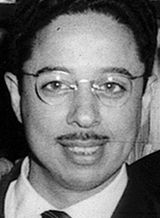Horacio Salgán: Difference between revisions
m links added |
m link fixed |
||
| Line 16: | Line 16: | ||
'''Horacio Adolfo Salgán''' (b. June 15, 1916, in [[Buenos Aires]]) is an [[Afro-Argentine]] pianist, composer, orchestra leader, and arranger who specializes in [[tango music]].<ref>[http://www.indyweek.com/indyweek/the-blackness-of-tango/Content?oid=1197334 The blackness of tango Dance's dark roots in a country "without blacks" <!-- Bot generated title -->]</ref> |
'''Horacio Adolfo Salgán''' (b. June 15, 1916, in [[Buenos Aires]]) is an [[Afro-Argentine]] pianist, composer, orchestra leader, and arranger who specializes in [[tango music]].<ref>[http://www.indyweek.com/indyweek/the-blackness-of-tango/Content?oid=1197334 The blackness of tango Dance's dark roots in a country "without blacks" <!-- Bot generated title -->]</ref> |
||
Salgán began studying piano at age six. At age 18 he joined the cast of Radio Belgrano as a soloist and back-up musician. At 20 he was discovered by orchestra leader [[Roberto Firpo]], who hired Salgán for his orchestra. In late 1942 he made his first recording, and in 1944 put together his own orchestra, which lasted until 1947. Salgán then devoted himself to composing and teaching and in 1950 returned with a new orchestra. 1960 saw the formation of the Quinteto Real, with Salgán on piano, [[Enrique Francini]] on violin and [[Pedro Láurenz]] on bandoneón. The goal of the group was to create instrumental tangos designed for listening rather than dancing. In 1998 he appeared as himself in the Oscar-nominated Best Foreign Language Film ''[[Tango, no me dejes nunca]]'' as part of El Nuevo Quinteto Real, an incarnation of the original group. |
Salgán began studying piano at age six. At age 18 he joined the cast of Radio Belgrano as a soloist and back-up musician. At 20 he was discovered by orchestra leader [[Roberto Firpo]], who hired Salgán for his orchestra. In late 1942 he made his first recording, and in 1944 put together his own orchestra, which lasted until 1947. Salgán then devoted himself to composing and teaching and in 1950 returned with a new orchestra. 1960 saw the formation of the Quinteto Real, with Salgán on piano, [[Enrique Mario Francini]] on violin and [[Pedro Láurenz]] on bandoneón. The goal of the group was to create instrumental tangos designed for listening rather than dancing. In 1998 he appeared as himself in the Oscar-nominated Best Foreign Language Film ''[[Tango, no me dejes nunca]]'' as part of El Nuevo Quinteto Real, an incarnation of the original group. |
||
Some of Salgán's most well-known compositions include ''Del 1 al 5 (Días de pago)'' (1944), ''Don Agustín Bardi'' (1947), ''Entre tango y tango'' (1953), ''Grillito'', ''La llamo silbando'', ''Cortada de San Ignacio'', and ''A fuego lento''. |
Some of Salgán's most well-known compositions include ''Del 1 al 5 (Días de pago)'' (1944), ''Don Agustín Bardi'' (1947), ''Entre tango y tango'' (1953), ''Grillito'', ''La llamo silbando'', ''Cortada de San Ignacio'', and ''A fuego lento''. |
||
Revision as of 20:09, 19 May 2012
Horacio Salgán | |
|---|---|
 | |
| Born | June 15, 1916 |
| Occupation(s) | Pianist, composer, orchestra leader, and arranger |
Horacio Adolfo Salgán (b. June 15, 1916, in Buenos Aires) is an Afro-Argentine pianist, composer, orchestra leader, and arranger who specializes in tango music.[1]
Salgán began studying piano at age six. At age 18 he joined the cast of Radio Belgrano as a soloist and back-up musician. At 20 he was discovered by orchestra leader Roberto Firpo, who hired Salgán for his orchestra. In late 1942 he made his first recording, and in 1944 put together his own orchestra, which lasted until 1947. Salgán then devoted himself to composing and teaching and in 1950 returned with a new orchestra. 1960 saw the formation of the Quinteto Real, with Salgán on piano, Enrique Mario Francini on violin and Pedro Láurenz on bandoneón. The goal of the group was to create instrumental tangos designed for listening rather than dancing. In 1998 he appeared as himself in the Oscar-nominated Best Foreign Language Film Tango, no me dejes nunca as part of El Nuevo Quinteto Real, an incarnation of the original group.
Some of Salgán's most well-known compositions include Del 1 al 5 (Días de pago) (1944), Don Agustín Bardi (1947), Entre tango y tango (1953), Grillito, La llamo silbando, Cortada de San Ignacio, and A fuego lento.
